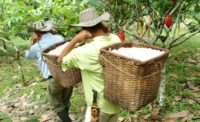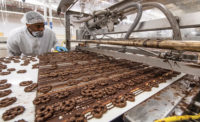Colombia touts manufacturing and production capabilities to the world
Country’s confectionery market poised to grow through 2026.

ProColombia hosted the 90th Business Matchmaking Forum in Cali and Medellín at the end of March 2022 with the goal of connecting global buyers to Colombian producers and manufacturers. Photo from ProColombia.

Outgoing President Iván Duque Márquez greets attendees of the 90th Business Matchmaking Forum held March 30-April 1 in Cali, Colombia. Photo by Alyse Thompson.

ProColombia's 90th Business Matchmaking Forum, held in person for the first time since 2019, connected hundreds of global buyers with Colombian producers and manufacturers. Photo by Alyse Thompson.

Celis Candies, based in Santander, Colombia, is a third-generation family business that makes traditional caramels. Photo by Alyse Thompson.

Comestibles Aldor, based in Cali, has focused on manufacturing gummies, one of the fastest-growing confectionery categories. Photo by Alyse Thompson.

Colombina has its own markets in cities across Colombia that carry its expansive portfolio of brands. Photo by Alyse Thompson.






As the world seeks to move forward from the COVID-19 pandemic, Colombia is looking beyond reactivation to economic growth.
ProColombia, a government agency promoting exports, tourism and foreign investment, held its 90th Business Matchmaking Forum at the end of March — its first in-person event in three years — with the goal of connecting global buyers to Colombian producers and manufacturers. This event also marked 200 years of bilateral relations between the U.S. and Colombia, as well as the 10th anniversary of the free trade agreement between the two countries.
Outgoing President Iván Duque Márquez opened the forum in Cali by pointing to the challenges the country faced during the pandemic and how measures it has taken under the “Commitment to Colombia” reactivation plan have promoted infrastructure projects, renewable energy, housing, and agricultural development.
Citing the International Monetary Fund, Duque said Colombia’s economy was set to grow by 5.8 percent in 2022.
“And it is that nothing bends us Colombians, nothing brings us to our knees, we have faith, we have courage and we get ahead,” Duque said, translated from Spanish. “And the greatest demonstration of how our country is getting ahead is to see this room full of Colombian businesspeople who want to go out and conquer the world.”
By hosting part of the Business Matchmaking Forum in Cali, which is located in southwest Colombia, ProColombia aimed to shine a light on the manufacturing and production capabilities of the city and the surrounding regions of Valle del Cauca, Cauca and Nariño — particularly after 2021 protests over proposed tax and health care reform suspended some business operations.
“We are honoring this city and this region, which, as always, have given us a warm welcome, and whose business fabric stands out for its resilience, drive, ability to adapt and creativity,” said Flavia Santoro Trujillo, president of ProColombia, translated from Spanish. “This has been demonstrated with concrete facts. You will remember that last year Cali and the region were affected by a situation that impacted its economy. However, we redouble our efforts to provide empathetic and effective support to the private sector in the southwestern region.”
In Cali, the Business Matchmaking Forum drew 1,170 companies from 22 Colombian regions and coordinated meetings between 580 international buyers. In April, ProColombia reported that the forum in Cali — and its companion event in Medellín — resulted in $5.1 million in deals between Colombian companies and U.S. buyers, with an estimated $14.1 million in deals to be finalized in the following three to six months.
Santander-based Celis Candies was among the companies participating in the forum. Juan Pablo Celis Vargas, representing the third generation of candy makers, wants to expand sales of his traditional soft caramels across the United States.
Though he currently works with a distributor in Miami, Celis Vargas has his sights set on other U.S. regions with a strong Latino presence — just like his father hoped to do.
“I want to continue that dream,” he said.
While Colombia has a robust confectionery industry, the country is often recognized for its coffee, grown primarily in the “Coffee Triangle” in Colombia’s mountainous western region.
Compass Coffee, based in Washington D.C., attended the Business Matchmaking Forum with the goal of sourcing coffee beans. The company’s Waypoint Blend is made with Colombian coffee, and it features a dark roast with flavor notes of brown sugar and cacao.
Chas Newman, production manager at Compass Coffee, says the company works with exporters who have local knowledge and connections, allowing it to invest in the farms.
“We succeed only if they succeed,” he said. “We want to empower them.”
Colombian confectionery
With access to local cocoa and sugarcane crops, Colombia is well positioned for strong confectionery manufacturing and sales.
Citing research from Euromonitor and Global Data, the National Confectioners Association reported that the Colombian confectionery market is valued at $1.4 billion, representing 3.3 percent of the Latin American market.
Colombian chocolate sales totaled COP $677.9 billion (USD $169.5 million) in 2021. They’re expected to reach COP $923 billion (USD $238 million) by 2026, representing a five-year annual growth rate of 5.8 percent.
Meanwhile, sugar confectionery sales generated COP $602 billion (USD $150.6 million) in 2021. They’re projected to grow 3 percent through 2026 to reach COP $696.5 billion (USD $174.3 million).
Leonardo Aljure, CEO of Cali-based Comestibles Aldor, said the company, founded by his father in 1991, has focused on gummies, one of the fastest-growing categories in Colombia. Aldor installed a new mogul in October 2021.
“The gummies have a broad consumer base,” he said.
Aldor has exported its confectionery products to the Americas and the Caribbean since the early 1990s, but it began exporting to South Africa toward the end of that decade. Aljure said the country fell in love with its lollipops — so much so that Aldor built a factory in Johannesburg.
“We brought something new, something disruptive,” he said. “We brought some of our Colombian flair.”
Colombina S.A. — No. 5 on our 2021 ranking of the Top South American Candy Companies and No. 55 on the 2022 Global Top 100 — is one of Colombia’s largest confectionery companies and it’s also headquartered in Cali.
Founded in 1927, the company has seven production plants — five in Colombia — and exports to more than 90 countries. Colombina’s confectionery portfolio includes gummies, gum, mints, lollipops, hard candies, marshmallows and a variety of chocolate products.
In 2015, the company launched the Colombina 100% brand, which features products made with natural colors and flavors and added nutritional benefits.
Andrés Sánches Tejada, confectionery manager for Colombina, pointed to consumers’ desire to balance indulgence with healthier products.
“We learned that consumer needs are changing,” he said.
Looking for a reprint of this article?
From high-res PDFs to custom plaques, order your copy today!
















